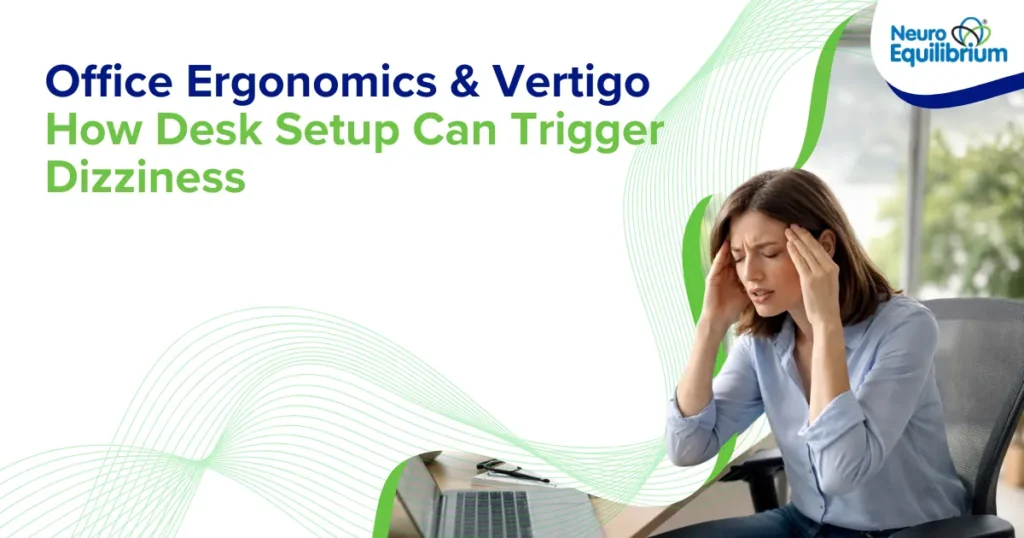Chennai is known for its hot and humid climate. While many individuals adapt to the weather, individuals who experience dizziness or experience vertigo tend to recognize that these conditions become more severe during hot seasons. This is not necessarily directly connected but dehydration affects a lot. Loss of more fluid than intake can cause an unbalance in the body, which can influence the inner ear, which makes the symptoms of vertigo harder. When you often have a feeling of dizziness, imbalance or that spinning feeling, it is worth knowing how proper hydration, lifestyle and medical tests can assist you in coping with those problems and feeling better.
The Link Between Heat, Hydration, and Dizziness
Hot weather does not cause vertigo directly. Nevertheless, the conditions which are associated with high heat like dehydration and electrolyte imbalance tend to exacerbate dizziness.
Why hydration matters for balance
- Water assists in the maintenance of the fluid balance of the body.
- The loss of water may cause blood pressure to drop, making one feel lightheaded or faint.
- It is highly likely to cause dizziness among children and teenagers who substitute water with sugary or caffeinated beverages in hot conditions.
- The fluid requirements of pregnant women are greater and dehydration or low blood sugar may lead to more serious dizziness.
Since the inner ear relies on fluid balance for accurate signaling, even mild dehydration can trigger vertigo or make existing balance disorders feel worse.
Know More About Vertigo
- Understanding Vertigo: Common Triggers and Effective Management Strategies
- Best Vertigo Specialist in Indore: Clinics, Tests & Treatment Options
- Vertigo Test Cost in Bangalore: VNG, DVA, SVV & More
Managing Vertigo Symptoms Through Hydration
For those in Chennai, staying well-hydrated isn’t just about feeling comfortable, it’s an easy way to help prevent dizziness. Here are some simple tips to get started:
- Hydrate: 6-8 glasses of water daily: It is important to note that you must drink in small amounts at a time rather than drink all at once.
- Good inner ear functioning: Inner ear fluid is required to produce balance and hence the need to ensure the inner ear is hydrated.
- Avoid diuretics: Caffeine and alcohol would tend to make more fluid loss and can make one feel dizzy. Reduce them especially during hot seasons.
- Watch salt: Salt can cause fluid to build up in the inner ear worsening vertigo in such diseases as Meniere’s Disease.
These steps won’t replace medical testing, but they can help reduce the day-to-day triggers of dizziness.
Common Triggers of Vertigo in Hot Climates
In a city like Chennai, several factors can contribute to vertigo episodes:
- Heat and dehydration: When the body is exposed to high temperatures, it tries to cool itself by producing sweat. However, if the lost fluids and electrolytes are not replaced, it leads to dehydration. This condition occurs when the body loses more water than it takes in, causing an imbalance that affects normal body functions. Symptoms may include dry mouth, dizziness, fatigue, headache, muscle cramps, and reduced urine output. Severe dehydration can lead to heat exhaustion or heat stroke, which are medical emergencies. Staying hydrated by drinking water and electrolyte-rich fluids is essential, especially in hot conditions or during physical activity.
When Should You See a Specialist?
You don’t need to rush to a clinic for every dizzy spell, but you should seek medical advice if:
- The dizziness or loss of balance persists for a few days.
- You have the feeling of spinning (vertigo) which disrupts everyday life.
- Repeated falls or almost falls occur.
- Dizziness is also accompanied by ringing in the ear (tinnitus).
- Vertigo is accompanied by nausea, headaches or blurred vision.
Balance evaluations like VNG (Videonystagmography) can be helpful in helping doctors figure out whether the problem originates from the inner ear, the vestibular nerve, or the brain’s balance centers. Additionally, other tests such as DVA, or Posturography might also be recommended to get a comprehensive understanding.

Why Choose NeuroEquilibrium Clinics in Chennai?
In NeuroEquilibrium, testing depends on the symptoms of the individual patient. There are highly developed diagnostic devices at a clinic and doctors specialized in the field of dizziness and balance disorders. Patients benefit from:
- Modern vestibular equipment testing.
- Individual diagnosis and treatment plans
- Instructions concerning changes in lifestyle, like hydration and diet.
NeuroEquilibrium Clinic Locations in Chennai
If you are in Chennai and dealing with dizziness, vertigo, or imbalance, you can book a visit at any of these clinics:
- Porur
Location: Porur, Chennai, Tamil Nadu
Pincode: 600156
Book Visit: https://www.neuroequilibrium.in/clinic/chennai/
- T Nagar
Location: T Nagar, Chennai, Tamil Nadu
Pincode: 600017
Book Visit: https://www.neuroequilibrium.in/clinic/chennai/
- Anna Nagar (600101)
Location: Anna Nagar, Chennai, Tamil Nadu
Pincode: 600101
Book Visit: https://www.neuroequilibrium.in/clinic/chennai/
- Anna Nagar (600040)
Location: Anna Nagar, Chennai, Tamil Nadu
Pincode: 600040
Book Visit: https://www.neuroequilibrium.in/clinic/chennai/
- Kodambakkam
Location: Kodambakkam, Chennai, Tamil Nadu
Pincode: 600034
Book Visit: https://www.neuroequilibrium.in/clinic/chennai/
Sources
- Altın B., et al. (2022). Is inadequate water intake a risk factor for vestibular disorders? PMC. https://pmc.ncbi.nlm.nih.gov/articles/PMC10682806/
- Seladi-Schulman J. (2020). Can Dehydration Cause Vertigo? Healthline. https://www.healthline.com/health/can-dehydration-cause-vertigo
- Dizziness and Vertigo — Overview. MSD Manuals, 2025. https://www.msdmanuals.com/home/ear-nose-and-throat-disorders/symptoms-of-ear-disorders/dizziness-and-vertigo
- A Healthy Diet for Managing Vertigo. Abbott Care. https://acare.abbott.com/en/articles/neurology/healthy-diet-for-managing-vertigo/
- What to Eat and What to Avoid if You Suffer from Dizziness. Amplifon. https://www.amplifon.com/uk/audiology-magazine/diet-for-vertigo
- Vertigo Remedies: Helpful Tips for Vertigo Patients. Cincinnati Upper Cervical. https://cincinnatiuppercervical.com/vertigo-remedies-10-helpful-tips-for-vertigo-patients/
- How Heat Can Worsen Vertigo Symptoms. FYZICAL Therapy & Balance (blog). https://www.fyzical.com/north-hills-nc/blog/Summer-Vertigo
Can hot weather really trigger vertigo?
Even though heat is not considered to be a cause of vertigo, hot and humid environment can lead to dehydration and electrolyte imbalance, which worsens dizziness and balancing problems.
How much water should I drink to prevent vertigo episodes in Chennai?
Goal: 6-8 glasses of water per day in portions throughout the day. Caffeinated and sweetened beverages should not be used to substitute water and they may lead to the loss of fluid balance.
Are there specific foods or drinks that can worsen vertigo in hot climates?
Yes. Foods with a high amount of salt, caffeine, and alcohol may influence fluid balancing and functioning of the inner ear and may contribute to the severity of vertigo.
When should I see a specialist for vertigo?
Consult the doctor in case of ongoing dizziness that lasts more than several days, affects the normal life, mixed with spinning, frequent falls, ringing in the ears, nausea, headache or blurred vision.
What tests are used to diagnose vertigo at NeuroEquilibrium Clinics?
Common examinations are VNG (Videonystagmography) DVA and Posturography. These help to establish the presence of vertigo in the inner ear or in the nerve of the vestibulum to the very end up to the balance centres of the brain.
















